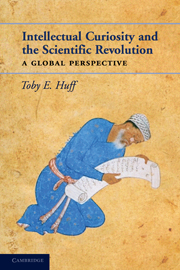Book contents
- Frontmatter
- Contents
- Illustrations
- Preface
- Acknowledgments
- Part I Something New under the Sun
- 1 Introduction
- 2 Inventing the Discovery Machine
- 3 The New Telescopic Evidence
- 4 The “Far Seeing Looking Glass” Goes to China
- 5 The Discovery Machine Goes to the Muslim World
- Part II Patterns of Education
- Part III Science Unbound
- Selected References
- Index
1 - Introduction
Published online by Cambridge University Press: 05 June 2012
- Frontmatter
- Contents
- Illustrations
- Preface
- Acknowledgments
- Part I Something New under the Sun
- 1 Introduction
- 2 Inventing the Discovery Machine
- 3 The New Telescopic Evidence
- 4 The “Far Seeing Looking Glass” Goes to China
- 5 The Discovery Machine Goes to the Muslim World
- Part II Patterns of Education
- Part III Science Unbound
- Selected References
- Index
Summary
The seventeenth century was one of the most dynamic and eventful centuries in the history of the modern world. It can be called the great divide that separated Western Europe developmentally from the rest of the world for the next three and a half centuries. During the 100 years of the seventeenth century, the scientific revolution in Europe produced an enormous flow of discoveries that transformed scientific thought. These discoveries occurred in astronomy, optics, the science of motion, mathematics, and the newly created field of physics. The Newtonian synthesis brought forth for the first time an integrated celestial and terrestrial physics within the framework of universal gravitation. Advances were also made in hydraulics and pneumatics, medicine, microscopy, and the study of human and animal anatomy. Not least of all, big steps were taken toward the discovery of electricity.
Given this extraordinary pattern of discovery, it is easy to ask why all this did not happen elsewhere. Simply put, why the West? Why did the Western world take off and become the dominant scientific, economic, and political power on this planet? Why did the great civilizations of China, India, and the Muslim Middle East, with their long records of growth and accomplishment, fall behind? Today, the prevailing view is that whatever happened culturally and developmentally in the West must have taken place elsewhere because people are basically the same in all places. The sociologist and medieval historian Benjamin Nelson called this idea uniformitarianism.
- Type
- Chapter
- Information
- Intellectual Curiosity and the Scientific RevolutionA Global Perspective, pp. 3 - 21Publisher: Cambridge University PressPrint publication year: 2010



